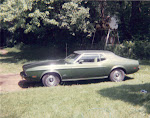I seem to always find a couple of books of local interest at the Normal Public Library Book Sale, and this time was no exception. I bought the book Transactions of the Illinois State Historical Society 1930, published by the Illinois State Historical Library in 1930. There is an entry by Mrs. Florence Fifer Bohrer, Member Illinois State Senate, about how McLean County got its name: "John McLean and the County that Bears His Name" (pages 150-156).
John McLean was born in North Carolina (a slave state) in 1791 and moved to Kentucky when he was four. His father was a minister and was related to the Ewing family. John moved to Shawneetown in southern Illinois and was admitted to the bar. In 1818 he was elected to Congress as a Democrat and he was pro-slavery. He served until 1824 and then was elected to complete the term of a United States Senator. In 1829 he was serving in the Senate but his health was failing so he returned to Shawneetown where he died at the age of 39.
It sounds like he was very healthy in his younger days, because a neighbor of his said that he would "go to log-rollings, corn-huskings, house-raisings and country frolics" and "he could beat all comers at running, jumping and lifting" (page 153)! It's surprising that he died so young. I guess serving as an elected official takes it toll.
He never came to the area that is now McLean County but it was named in honor of him as suggested by Mr. William Ewing, who happened to be the Speaker of the House when a committee presented him with a petition to create a new county. The county was officially created in December, 1830, just two months after McLean's death.
At the end, Mrs. Bohrer writes that if John McLean could visit McLean County "today" (1930), he would "be moved by the outward changes which the new industrial and economic order has wrought, the automobile, air-ship, the fine roads and splendid institutions" (page 156). Of course, we take these things for granted, especially the air-ships.
Saturday, March 26, 2011
Saturday, March 19, 2011
Normal (and other local) Street Name Origins
There is a document, courtesy of the McLean County Genealogical Society, posted on the internet that lists names of streets in Normal, Bloomington, and McLean County, and also lists the origins of those names. Some of the streets were named for types of trees (Elm, Oak, Pine, etc.). Many of the streets were named for local people, although the list does not include information about those people. Some streets were named with Abe Lincoln in mind (Lincoln, Lincolnwood, Todd), one street was named for General Douglas MacArthur (MacArthur), and two streets were named for General Winfield Scott (Scott, Scott Street). A couple of streets were named for stores (Ward Drive for Montgomery Ward, and Carson Drive for Carson, Pirie, Scott & Co.).
A few streets have local historical significance: Butcher's Alley and Butcher's Lane were near slaughter houses; Circle Ave. was a former racetrack; Division St. divides Normal from Bloomington, of course; Fairview St. was near the fairgrounds (I never made that connection!); and Lumber St. was where lumber was unloaded from the train. Two streets were named for cars: Continental Court was named for the Lincoln Continental, and Fleetwood was name for the Cadillac Fleetwood. London Way (as in England), Orlando (as in Florida), and Orleans Drive (as in New Orleans, Louisiana) were named for places.
Center, East, and North streets were so named because they represented the outer boundaries of the city/town at that time. The way this area keeps growing, that was definitely a mistake!
A few streets have local historical significance: Butcher's Alley and Butcher's Lane were near slaughter houses; Circle Ave. was a former racetrack; Division St. divides Normal from Bloomington, of course; Fairview St. was near the fairgrounds (I never made that connection!); and Lumber St. was where lumber was unloaded from the train. Two streets were named for cars: Continental Court was named for the Lincoln Continental, and Fleetwood was name for the Cadillac Fleetwood. London Way (as in England), Orlando (as in Florida), and Orleans Drive (as in New Orleans, Louisiana) were named for places.
Center, East, and North streets were so named because they represented the outer boundaries of the city/town at that time. The way this area keeps growing, that was definitely a mistake!
Saturday, March 12, 2011
Sunday, March 6, 2011
Tuesday, March 1, 2011
Normal Nut Park
Planters -- the purveyor of peanuts -- is going to build small, peanut-shaped parks (called Planters Parks) on pockets of unused land in select cities. Each park will have its own Mr. Peanut statue! Ok, so it's like a living advertisement for their product. But if it provides a bit of green space and doesn't involve much upkeep (maybe volunteer groups could handle that), why not?
Of course, if Beer Nuts would like to offer their own version of green spaces (Beer Nuts Niches?), that would be nice.
Of course, if Beer Nuts would like to offer their own version of green spaces (Beer Nuts Niches?), that would be nice.
Subscribe to:
Posts (Atom)







